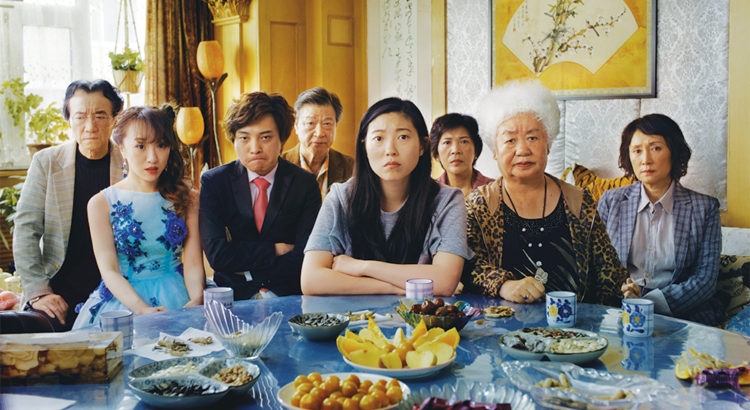The Farewell is a movie about an ending coming suddenly into sight. Billi (Awkwafina) comes home to do laundry and comes away with the knowledge that her grandmother, Nai Nai (Zhao Shuzhen), has only a few months to live. With that fatal deadline looming, the entire family has decided to lie to Nai Nai, hoping to ease her mind by keeping the diagnosis of lung cancer a secret. Billi, though, has her doubts, complicated, in no small part, by her own need to say goodbye. But the rest of the family is insistent. They will gather together at Nai Nai’s apartment in China under the false pretense of a wedding. They will carry this secret so that Nai Nai won’t have to.
Much of the comedy comes from the fact that no one – not Billi, not her parents, not her uncles or cousins – can bear the weight of that secret entirely. The cracks widen with each barely mustered smile, with each nervous side-glance after a misplaced word. There is a palpable awkwardness to every interaction, as every member of the clan works to maintain a flailing façade. Even the shots are intentionally awkward. Frames are shot from the perspective of an individual in the scene, inserting the viewer first-hand into the lie. We are confronted by the knowing faces and a painful self-awareness. And we laugh as those faces contort into an expression resembling a smile. Because what else is there to do in a situation as dire as a coming death? So, the secret becomes an elaborate distraction, as much for the living’s sake as for the dying.
Together, the family help Nai Nai assemble the wedding. She attacks the tasks with a relentless zeal. There is no danger greater, after all, than a grandmother spurned. Of course, the wedding must have lobster instead of crab. Of course, the couple must be posed to indicate a perfect romance. Anything less would be unworthy of the family she has built. Nai Nia projects such familial fierceness that the false occasion takes on more than a tinge of truth. Feelings that were once faked become frighteningly real. Tensions buried for years bubble up and erupt. For as much as the family is united, they are also fractured in ways that only family can be. Billi’s father (played as a plodding gloom by Tzi Ma) and her uncle (Yongbo Jiang) are constantly at odds. They have been separated by long years and longer distances. While Billi’s father moved his small portion of the clan to the United States, his brother chose Japan. Now, they are brought together once again, back to where they came from. They share cigarettes at night while splitting a much heavier burden. They will have to be the pillars of the family from now on.
These poignant, lingering moments are sometimes interrupted by less poignant moments that linger even longer. The director, Lulu Wang, often uses slow-motion shots for emphasis but it comes off as syrupy instead. There is a sense of trying a bit too hard to romanticize the moment, as if the movie is memorializing this moment just as the characters are memorializing theirs. It is a good sentiment, executed less than perfectly. By, what feels like, the fiftieth poignant moment, you want the film to move on. But it can’t. The movie is stuck. The characters are stuck between celebrating life and mourning death, one that is still approaching. The film is premised on binaries. To tell or not to tell. Lobster or crab. Life or death. But as each character discovers, they reside in spaces that feel not quite right and not quite wrong. The Farewell meanders well, following the characters as they explore the mediums between the extremes. It is the static points where it struggles.
Billi, mainly drifts between the extremes of modernity and traditionally held values. It is also a question of how others perceive her, a young Chinese American living alone in New York City, and how she sees herself, a struggling writer searching for some of that childhood stability. She is, like many first-generation Americans, struggling to reconcile the alienation she feels from all sides. In herself, Billi embodies every influence throughout her life, from the gentle reproaches of Nai Nai and her parents, to the harsher financial admonishments of the American economy. The Farewell, then, is not only a film about moving in ambiguous places but also how those ambiguities can be incorporated within. The Farewell doesn’t much deal with resolute truths. It is more comfortable with lies and half-facts. We all are. And in death, as in life there really is no such thing as an absolute surety.




